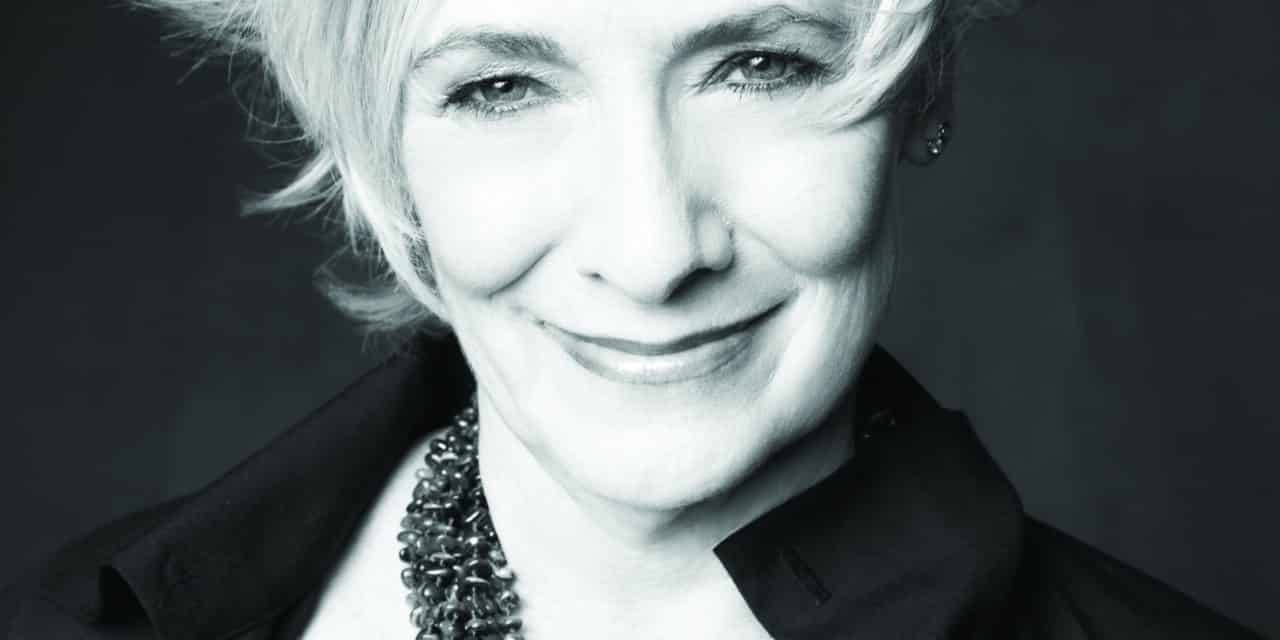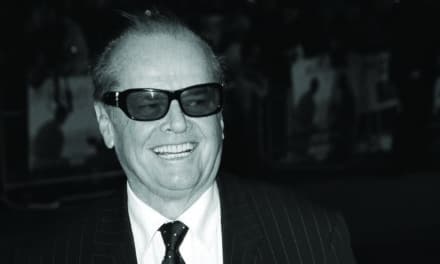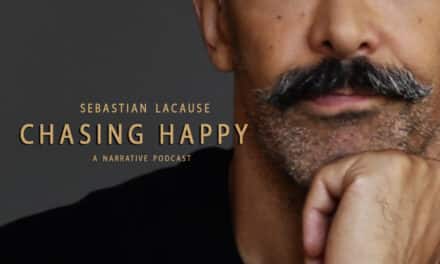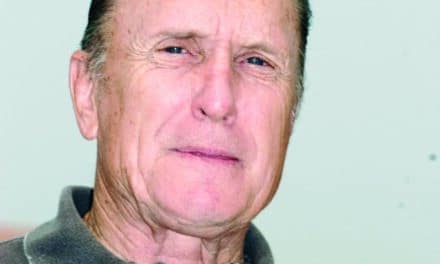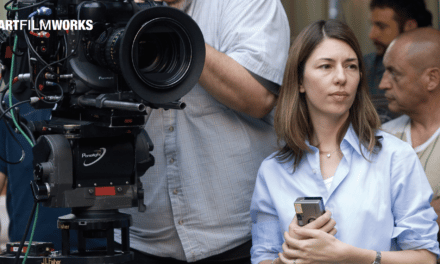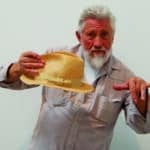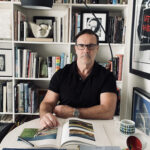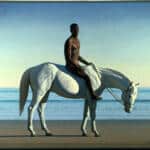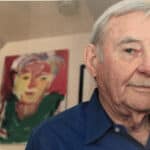DINA EASTWOOD TALKS WITH BETTY BUCKLEY
ARTWORKS Winter 2010
If you don’t know her name, you probably recognize her face from her many TV and film performances, but you most certainly know her voice. Betty Buckley won a Tony Award for her role in “Cats.” Her signature rendition of Andrew Lloyd Webber’s “Memory” is a classic. She has a big, booming unforgettable voice. In fact, New York Magazine called her “The Voice of Broadway.” She has also spent a good deal of time in front of the camera, with perhaps her best known role coming in the TV dramedy “Eight is Enough.” Buckley played the role of Abby from 1977-1981, but she has an extensive film resume with roles in “Carrie,” “Tender Mercies,” “Another Woman,” “Frantic,” “The Happening,” among others. When I caught up with her she was in the middle of workshop rehearsals for the stage performance of Tales of the City, originally written by Armistead Maupin. It’s a friendly romp through San Francisco in the 1970’s – think Melrose Place with a definite Northern California bent. Scheduled to open in the spring. Despite a long list of acting credits, Buckley admits her first love is singing, whether it’s on stage or in the studio. In fact, she is right now finishing up an her latest CD with legendary producer T-Bone Burnett.
Dina: You and T-Bone Burnett have teamed up on a project, and your background together is quite a story?
Betty: We’ve just made a CD called “Ghost Light.” It’s a beautiful, timeless recording. I’m thrilled about it. T-Bone Burnett and I grew up together in Fort Worth, and he owned his own recording studio at 17. When we were both 19, he recorded the first archival recording of my voice. It was a reel-to-reel tape and there were two copies of it: one that went to my boyfriend, and one that went to my first agent. I don’t know what happened to the boyfriend, but the first agent, Rodger Hess, became a big Broadway producer. He kept it and played it for the publisher at Playbill Publishing. Two years ago, they released the record, called “Betty Buckley: 1967.” So, we sent a copy to T-Bone, (we’d kept in touch all these years), and he was very touched by it, and said, “We gotta’ make another record.” We did some beautiful standards, songs from Broadway. We did some Broadway songs to the likes of which you’ve never heard. It’s a beautiful record. I also released a CD in October called “Bootleg: Board Mixes from the Road.” It’s eight tracks of board mixes from the concerts I’ve done over the years.
Dina: Hard to believe you were singing in the mid-1960’s. What would iconic singer Betty, now, say to the young Betty?
Betty: I was very judgmental of myself at 19. I had a really clarion, soprano voice, and I thought it wasn’t husky and sexy enough. I thought all the great lady singers had these darker sounds to their voices. It was an interesting process when people wanted to release it – the 1967 recording as a record. I was hesitant and then I sat down to listen to it, which I hadn’t really done in all these years, and I realized there was something really pure and very direct. It was a part of my talent that as a young person I never cherished. I felt like I incorporated that girl into me in a very valuable way.
Dina:Isn’t it great how the judgment starts dropping away from life?
Betty: I think sometimes when you’re young, you’re striving so hard to grow and be better, and comparing yourself to others, and you are not completely cognizant of what you have. The getting older is about looking back and going, “Shoot, I wasted a lot of time. That was pretty special.” Now I look back and say, “That little girl could sing!”
Dina: Did your parents groom you for this kind of career?
Betty: Looking back, there was so much concern in my family, when they recognized I had talent, of NOT letting me in on the uniqueness of my talent for fear that I would become cocky and arrogant. And I think they went way too far in the other direction. I think it’s a balance. A kid with talent should be made aware that that talent is unique and special, but it’s not everything.
Dina: You studied journalism in college. Was that as a back-up plan if singing didn’t work out?
Betty: My father didn’t want me to be a singer at all. My mother had been a journalist, so my father thought that was a legitimate profession for a young lady, whose only real significance (in his mind) was to be married and have children. It was quite a “battle royal” between the two of us. He was a frustrated poet/artist, so I have more empathy and compassion for him now than I did then. I was very confused by his punitive nature in those days.
My mother was very much in support of my talent. She had been a singer and dancer, so she really facilitated the classes I needed to go to, and then I had his resistance (from my father). Without her, it would not have happened.
Dina: What brought led you from journalism to Broadway?
Betty: When I was 13, I KNEW I was going to be a singer on Broadway. I had a vision about it. Standing on the balcony of our house, looking out over the west Texas plain, I was listening to some music on the radio, and I had this vision of myself on Broadway, and I knew what my voice would sound like and I knew how it would affect people. And from that moment I was real sure of my path. When I was 35, when I was doing Cats on Broadway, they brought in the recording of Memory for me to hear. I had recorded the Cats album and I didn’t think I’d done a real good job. They said, “No, no, it’s good!” They brought it in all mixed, and let me hear it. I flashed back to that vision, and it took from age 13 to 35 – but there it was. One thing I’ve learned is that when you have a vision, you have an inner knowing, for sure you have the facility for that to manifest. It might take a different time frame or different path than you imagined, but you’ll get there, if you just keep going and learn what you have to learn.
It’s hard to know sometimes what a genuine inner vision is and what one picks up from the culture outside. Like when someone wants to be an actor. Do they want to be a TV star as opposed to loving the craft of story telling and the craft of acting? That’s where meditation is a great thing. Sometimes you have to really, go inside.
Dina: Much of the United States knows you as Abby Abbott on the television drama “Eight if Enough.” Was television a diversion or a stepping-stone?
Betty: It was a diversion. It was kind of a mindless decision I made because it seemed like a good decision at the time, but I did it without a lot of contemplation, and it was shocking. It was like working in a factory. It was OK because it was like a four-year school. It was very difficult for me to do that show in every way – personally, temperamentally, artistically- but it was like being in a forced environment of growth. Before that, I’d set my sights on becoming an actress of a certain ilk. My favorite actresses were Kim Stanley, Joanna Page, and Gena Rowland. I had this idea that I had to be “that expert” on realistic story telling, being such an authentic actress, and to be able to do that in the context of song was really necessary to me. When you do a TV show like “Eight is Enough,” we did 29 one-hour episodes a year for four years. Other than the golden era of Hollywood, there was no other opportunity to work that frequently. To watch what works and doesn’t work in your own work was a gift. That, combined with my studies as an actress, afforded me the opportunities to practice and grow. By the time I finished that endeavor, I got the film “Tender Mercies,” which was an extraordinary movie, with Robert Duvall. It was like the culmination of all this hard, intense factory level work I had been doing. It manifested into this incredible movie. I knew after that that I knew how to work. From there I got “Cats.” It was an extraordinary two years in my life.
Dina: Would you ever do another television episodic?
Betty: Television has evolved. There were scenes when I’d say to them on “Eight is Enough,” “Why don’t we try this, this,or this?” and they’d say “Are you crazy? That’s not what we do.” Then in a matter of years, that’s how people would shoot. I’d love to do television again in the right situation.
Dina: Showing up at the set, after a couple years, so hard?
Betty: I was really young, late 20’s, early 30’s, but they cast me and really expected me to act like a woman in her 40’s, so there was also a rub to that. It took about two years for us all to adjust to each other. Diana Hyland (the show’s original mother character) died of cancer, and they brought me in as a replacement, and she was a woman in her 40’s – but I was not. It was literally like being a real step-mother marrying into a family that had lost their mother and it was tough on all levels. But everybody made the adjustments and the third and fourth seasons went very smoothly. It was very nice.
Dina: Is your passion acting on stage or music?
Betty: Culturally we are raised to think in those comparative terms, but if you break it down, do those things really compare? I don’t really think they do. I think things are what they are and I love all of that. I would say, I was in special heaven making a record with T-Bone Burnett and the musicians we worked with including the great guitarist Bill Frisell. Every now and then you move into a realm of such extraordinary mastery of the collaborators around you that you just go slack jawed. You’re like, “Oh, my God” and it’s all about saying to yourself, “I deserve to be here.” T-Bone is just IT. He’s the best there is. It was just such a gift of love from him to make this record. I am just blown away by it. I’m not a pop star. There’s no reason on the face of this earth that he should have done this for me, but he wanted to, and it’s an extraordinary piece of art. I have never heard myself sing like that. I literally can’t wait for my friends and family and fans to hear it.
Dina: You seem to do it all. Do you also paint or draw?
Betty: I do draw. I have painted in the past. Each collection of songs I do, I think is like little paintings. The form of music, song and story telling are more ephemeral forms than canvas and paint, but it is the same for me. I see songs in terms of image, films that roll before my eyes, and colors and texture. I have done eleven recordings prior to now, and they’re all that. I really feel like we paint with songs.
Dina: Broadway, or shall I say acting in plays, has the least permanence of any of the arts—it’s erased every night!
Betty: I’m definitely a painter though, I paint portraits. If I am successful, you will see the painting I want you to see, but it’s also up to you to interpret it because it’s presented in such a way that it becomes part of your inner landscape. But it’s definitely a painting.
Dina: You also find time to teach. What is the most important message you give your students?
Betty: I teach song interpretation and meditation. Meditation is such a big part of my life. I teach in Fort Worth at the Modern Art Museum – all good story telling. Singing and acting is all about the ability to focus. Some of my students are high school students who are going off to conservatories. I have a housewife who has always been a singer, and I have a college professor who is getting a second wind on his career, so I teach many different people in different walks of life.
Dina: Are the younger people you teach affected by America’s “reality show-fame-concept”?
Betty: I’ve had to blast through resistance with the young people. You have to look at and see if it’s a calling for them. If it’s from the outside – the celebrity culture – or if it’s an inner vision and inner calling. I try to help people know if it’s coming from inside. When they find out how much work this is they are pretty shocked.
Dina: Do you ever have to tell a person that acting is not a good fit for them?
Betty: Some people have the audacity to tell kids they don’t have what it takes! I have seen people with a lot of talent flounder because they won’t work hard, and then people not as good make it with complete commitment and dedication. To say “you can’t cut it” is cruel hearted. Students have come to me in that wounded state. I feel so strongly that your family can’t tell you, your friends can’t tell you and certainly teachers cannot. If you have that conviction, you will make it. It may have it’s own time frame, but, it will happen.
In our culture, this culture of youth, if you haven’t done everything you want to do by the age of 24 forget it! It’s crazy. To be a really good singer or actor, it’s a lifelong commitment. It’s on going. There is NO magic formula to this. Talent helps – it’s a leg up. The rest is labor, sweat, tears. I have a voice teacher that I’ve studied with for years in New York. Everyone who is anyone has studied with her. Every once in a while she says young people come in and say, “Betty Buckley hasn’t had to go through this!” Our job is to make it look effortless, but there is SO much effort. I’ve been working on this since I was 11 years old. I have done this all my life. It’s a joke what most people think being an actor or singer is about. It’s a LOT of work, but it’s so worth it. Bliss is the reward. Being an actor and singer is joyous. Being a professional singer is bliss. It’s an honor and privilege.
See Betty in (Chicago Code, which starts in February in Chicago.)on TV and in Dallas in Arsenic and Old Lace. Her CD, Ghost Light with T-Bone Burnett, will hit stores in January.

